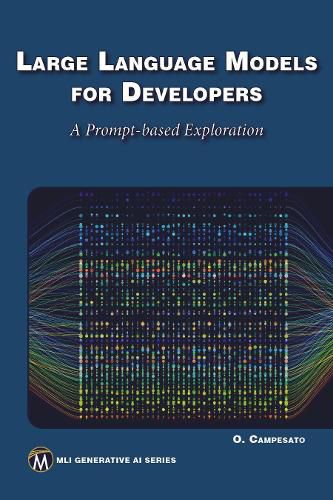Readings Newsletter
Become a Readings Member to make your shopping experience even easier.
Sign in or sign up for free!
You’re not far away from qualifying for FREE standard shipping within Australia
You’ve qualified for FREE standard shipping within Australia
The cart is loading…






This book offers a thorough exploration of Large Language Models (LLMs), guiding developers through the evolving landscape of generative AI and equipping them with the skills to utilize LLMs in practical applications. Designed for developers with a foundational understanding of machine learning, this book covers essential topics such as prompt engineering techniques, fine-tuning methods, attention mechanisms, and quantization strategies to optimize and deploy LLMs. Beginning with an introduction to generative AI, the book explains distinctions between conversational AI and generative models like GPT-4 and BERT, laying the groundwork for prompt engineering (Chapters 2 and 3). Some of the LLMs that are used for generating completions to prompts include Llama-3.1 405B, Llama 3, GPT-4o, Claude 3, Google Gemini, and Meta AI. Readers learn the art of creating effective prompts, covering advanced methods like Chain of Thought (CoT) and Tree of Thought prompts. As the book progresses, it details fine-tuning techniques (Chapters 5 and 6), demonstrating how to customize LLMs for specific tasks through methods like LoRA and QLoRA, and includes Python code samples for hands-on learning. Readers are also introduced to the transformer architecture's attention mechanism (Chapter 8), with step-by-step guidance on implementing self-attention layers. For developers aiming to optimize LLM performance, the book concludes with quantization techniques (Chapters 9 and 10), exploring strategies like dynamic quantization and probabilistic quantization, which help reduce model size without sacrificing performance. FEATURES * Covers the full lifecycle of working with LLMs, from model selection to deployment * Includes code samples using practical Python code for implementing prompt engineering, fine-tuning, and quantization * Teaches readers to enhance model efficiency with advanced optimization techniques * Includes companion files with code and images -- available from the publisher
$9.00 standard shipping within Australia
FREE standard shipping within Australia for orders over $100.00
Express & International shipping calculated at checkout
Stock availability can be subject to change without notice. We recommend calling the shop or contacting our online team to check availability of low stock items. Please see our Shopping Online page for more details.
This book offers a thorough exploration of Large Language Models (LLMs), guiding developers through the evolving landscape of generative AI and equipping them with the skills to utilize LLMs in practical applications. Designed for developers with a foundational understanding of machine learning, this book covers essential topics such as prompt engineering techniques, fine-tuning methods, attention mechanisms, and quantization strategies to optimize and deploy LLMs. Beginning with an introduction to generative AI, the book explains distinctions between conversational AI and generative models like GPT-4 and BERT, laying the groundwork for prompt engineering (Chapters 2 and 3). Some of the LLMs that are used for generating completions to prompts include Llama-3.1 405B, Llama 3, GPT-4o, Claude 3, Google Gemini, and Meta AI. Readers learn the art of creating effective prompts, covering advanced methods like Chain of Thought (CoT) and Tree of Thought prompts. As the book progresses, it details fine-tuning techniques (Chapters 5 and 6), demonstrating how to customize LLMs for specific tasks through methods like LoRA and QLoRA, and includes Python code samples for hands-on learning. Readers are also introduced to the transformer architecture's attention mechanism (Chapter 8), with step-by-step guidance on implementing self-attention layers. For developers aiming to optimize LLM performance, the book concludes with quantization techniques (Chapters 9 and 10), exploring strategies like dynamic quantization and probabilistic quantization, which help reduce model size without sacrificing performance. FEATURES * Covers the full lifecycle of working with LLMs, from model selection to deployment * Includes code samples using practical Python code for implementing prompt engineering, fine-tuning, and quantization * Teaches readers to enhance model efficiency with advanced optimization techniques * Includes companion files with code and images -- available from the publisher